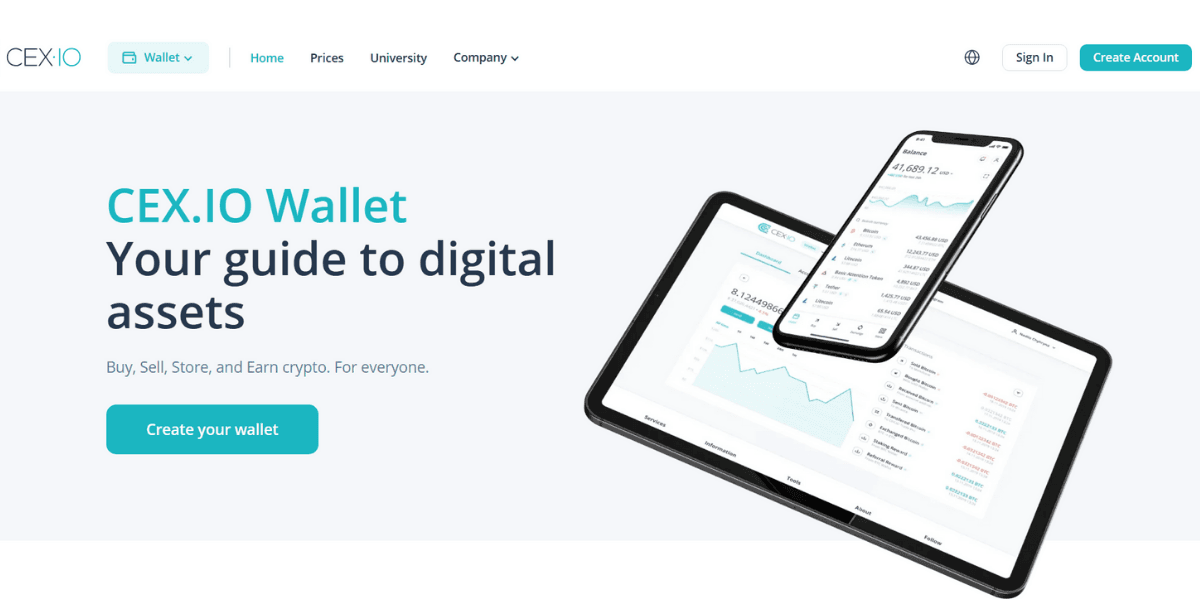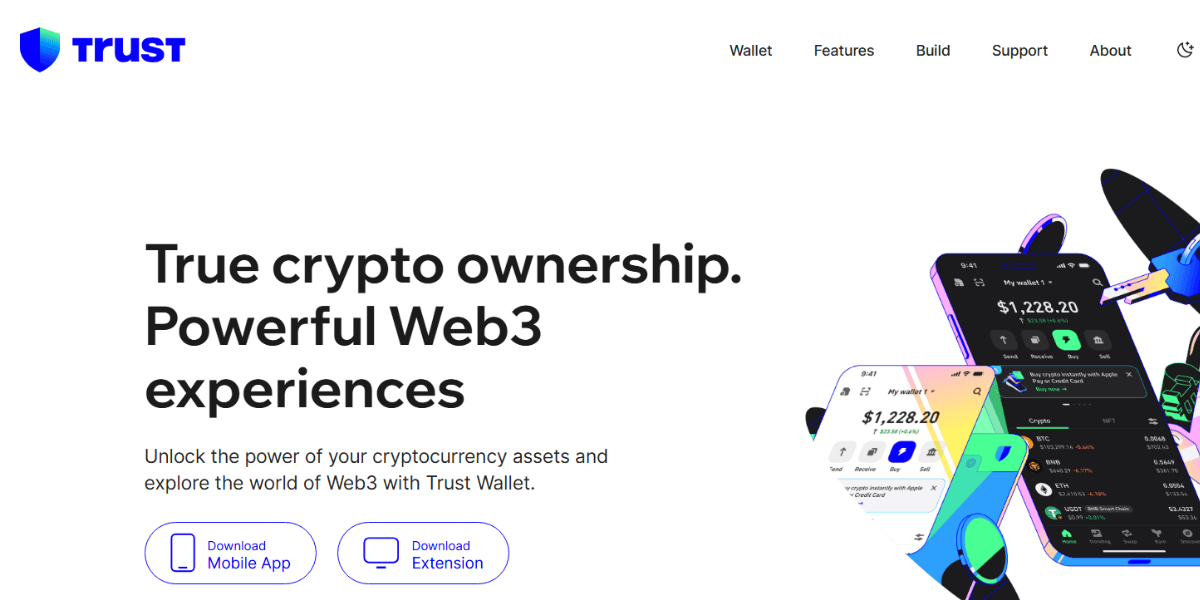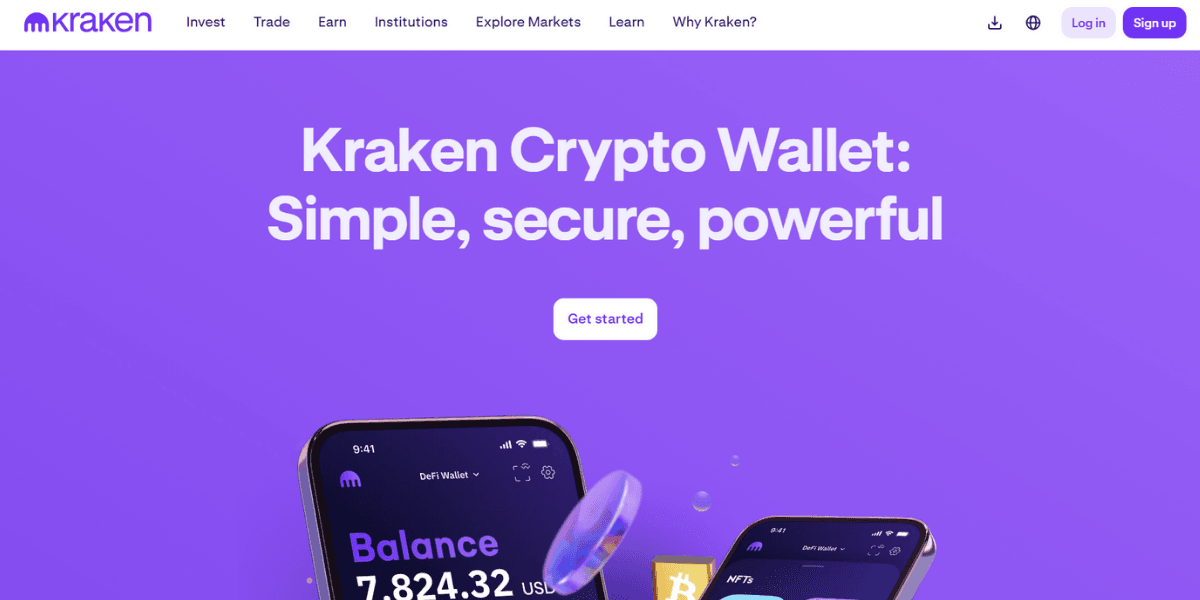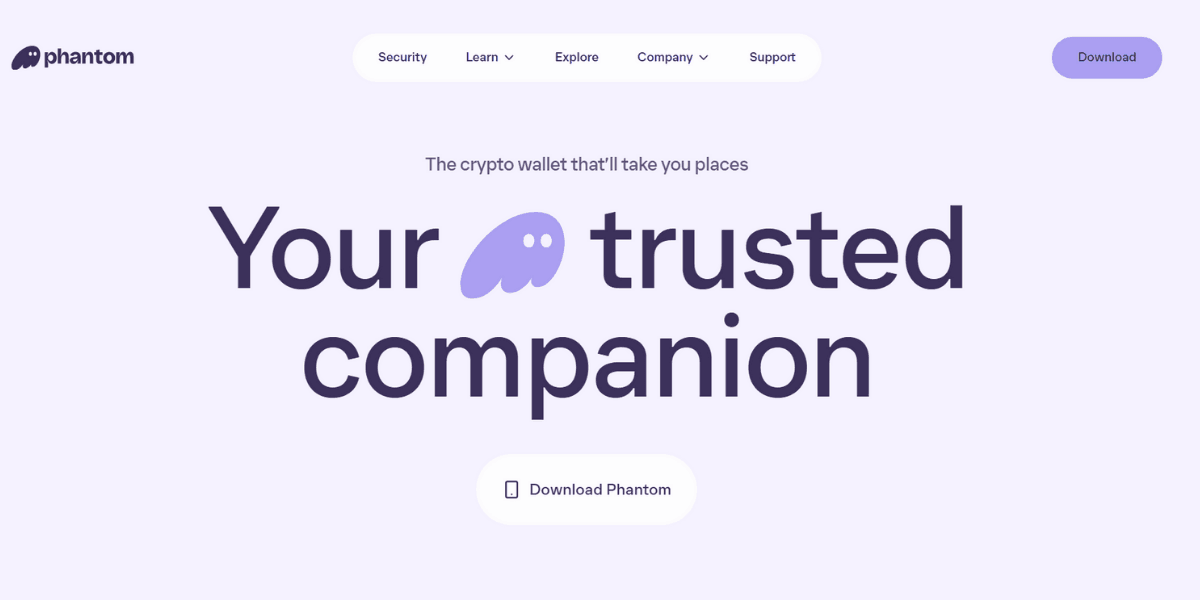Best Crypto Wallet in 2025
Choosing the best wallet for crypto is one of the most critical steps in protecting and managing your digital assets. In the U.S., enthusiasts look for security, usability, and broad asset support across Bitcoin and other leading cryptocurrencies.
Whether you prefer a mobile app for daily transactions or a multi-chain wallet for DeFi and NFTs, today’s options deliver more flexibility than ever.
In this review of the best crypto wallets, we’ll highlight leading providers, with CEX.IO standing out as our overall top choice.

Best Crypto Wallet Comparison
Choosing the best crypto wallet in 2025 means looking beyond brand names and focusing on practical factors. Each wallet offers different strengths, from fiat on-ramps to NFT handling and DeFi integrations.
To make your decision easier, we’ve compared core aspects like wallet type, key features, platforms, pricing, and ratings. You may also want to weigh customer support, security standards, token coverage, and integration with exchanges for a full picture.
Wallet | Wallet Type | Key Characteristics | Platforms | Price | Google Rating | Customer Support | |
CEX.IO | Hot wallet (custodial + app-based) | Integrated with CEX.IO exchange, fiat on-ramps, trading API, Spot Trading, crypto converter, and regulated security | iOS, Android, Web | Free | 4.4/ 5 | Strong compliance-grade support, email, and help center | |
TrustWallet | Hot wallet (non-custodial) | Multi-chain support, NFT handling, built-in DEX, strong mobile app experience | iOS, Android, Browser Ext. | Free | 4.4/ 5 | Limited to self-help guides, slower email support | |
Kraken Wallet | Hot wallet (non-custodial) | Self-custody, multi-chain, WalletConnect for dApps, optional exchange integration | iOS, Android | Free | 4.7/ 5 | Linked to Kraken exchange support, responsive but less wallet-focused | |
Phantom Wallet | Hot wallet (non-custodial)
| Solana-focused, strong NFT tools, staking, streamlined mobile/browser design | iOS, Android, Browser Ext. | Free | 4.7/ 5 | Basic help center and community forums, limited direct support | |
MetaMask Wallet | Hot wallet (non-custodial) | Ethereum-first, now supports Solana & other chains, Snaps extensions, deep DeFi access | iOS, Android, Browser Ext. | Free | 4.5/ 5 | Community-based help, guides, no live human support |
CEX.IO Wallet

CEX.IO is a global exchange with a strong presence in the U.S. market, offering a secure, regulated, and easy-to-use wallet.
The CEX.IO Wallet is designed for both beginners and seasoned traders, offering a combination of custody services and direct access to the broader CEX.IO ecosystem. Users can store Bitcoin and hundreds of other cryptocurrencies, manage assets across multiple markets, and seamlessly switch between buying, trading, and withdrawing.
As part of one of the longest-standing platforms in the industry, CEX.IO Wallet benefits from the exchange’s proven record of reliability, transparency, and customer support, making it a trusted option for U.S.-based crypto holders.
Key Features
CEX.IO Wallet is often regarded as the best crypto wallet app for U.S.-based enthusiasts who want simplicity and flexibility in one place. It enables the secure storage of Bitcoin, Ethereum, and over 300 other coins, while also integrating directly with CEX.IO’s Spot Trading markets. This means you can buy, sell, and trade without leaving the wallet interface.
Real-time data from the cryptocurrency prices page helps users make informed choices, while tools like Instant Buy and Crypto Converter make onboarding easy. The wallet supports multiple payment methods, ensuring quick funding and withdrawals. Designed with clarity in mind, it works smoothly across desktop and mobile apps.
CEX.IO Pros and Cons
CEX.IO stands out as the best cryptocurrency wallet because it combines the convenience of exchange-linked services with the security of a licensed provider. Unlike Trust Wallet or MetaMask, it offers direct fiat gateways, while also providing more institutional-grade protections than Kraken Wallet.
The only area for improvement is expanding advanced DeFi integrations, though this is marginal for most users.
Pros:
- Licensed and regulated in the US
- Stores 300+ cryptocurrencies, including Bitcoin
- Integrated Spot Trading
- Free access to the cryptocurrency prices page
- User-friendly wallet app on iOS/Android
- Multiple funding and withdrawal options
Cons:
- Limited DeFi/NFT features compared to MetaMask
- Fewer experimental tools than Phantom
Why Choose CEX.IO
For anyone looking for the best wallet for crypto, CEX.IO Wallet is a strong choice because it blends security, usability, and versatility in one crypto wallet app. It provides seamless access to digital assets, fiat on-ramps, and powerful trading tools without requiring multiple apps or accounts.
With features like Instant Buy, Spot Trading integration, and transparent fee structures, it suits both new entrants and long-term investors. Backed by over a decade of operational experience, CEX.IO crypto wallet app combines the trust of a regulated exchange with the simplicity of a modern mobile wallet, making it the best all-in-one solution for managing crypto in the U.S.
CEX.IO Wallet
Manage, buy, and store crypto in one place. CEX.IO Wallet gives you full control and seamless access to your digital assets.

Trust Wallet

Trust Wallet is a widely used crypto wallet backed by Binance, designed to give users a simple way to hold, buy, and swap thousands of digital assets.
Its mobile-first approach makes it appealing for everyday users who want quick access to tokens across multiple blockchains. Trust Wallet integrates directly with decentralized exchanges, making it a convenient choice for DeFi explorers.
However, while it offers broad token coverage and easy NFT management, it doesn’t carry the same level of regulatory safeguards or fiat on-ramps as CEX.IO. This means U.S.-based users may find it less comprehensive for managing both fiat and crypto.
Key Features
Trust Wallet excels in terms of accessibility, offering comprehensive multi-chain coverage and built-in Web3 browsing capabilities. Compared to Kraken Wallet, it provides deeper DeFi integrations and NFT support, but without Kraken’s exchange-grade transparency.
In relation to MetaMask, Trust Wallet is more beginner-friendly, offering a smoother mobile experience, although it lacks MetaMask’s extension ecosystem and enterprise-grade security updates.
Trust Wallet is well-suited for casual users who want broad token support on the go, but it falls short of the all-in-one services provided by larger platforms like CEX.IO.
Kraken Wallet

Kraken Wallet is a mobile-first, self-custody wallet for crypto developed by one of the industry’s most security-conscious exchanges.
Designed to strike a balance between usability and professional-grade tools, it supports major networks such as Bitcoin, Ethereum, and Solana, as well as a wide variety of ERC-20 and SPL tokens. Unlike standalone wallets, Kraken Wallet optionally links to the Kraken exchange, simplifying transfers while maintaining non-custodial control. Its NFT and DeFi integrations add extra utility, but it remains more conservative in scope compared to highly experimental wallets.
For users prioritizing security and compliance, Kraken Wallet offers a strong mix of trust and usability.
Key Features
Kraken Wallet focuses on simplicity and security, offering swaps, WalletConnect integration, and curated DeFi tools.
Compared to Phantom, Kraken Wallet is less fluid with Solana dApps but broader in multi-chain coverage.
Against MetaMask, Kraken Wallet lacks a vast extension ecosystem yet wins with easier onboarding and tighter integration with a regulated exchange. While Phantom and MetaMask are often chosen for experimentation, Kraken Wallet is favored by those who want a balance of proven safeguards and direct access to exchange-grade liquidity.
It offers fewer “extras” but remains one of the more reliable wallets in the U.S. market.
Phantom Wallet

Phantom is one of the most popular crypto wallets in the Solana ecosystem, renowned for its clean interface and advanced NFT management capabilities. Originally built for Solana, it now supports Ethereum and Polygon, catering to users who look for multi-chain flexibility.
Phantom integrates seamlessly with dApps, offering fast connections to DeFi protocols and NFT marketplaces. Its staking and token swap features are simple enough for beginners but efficient enough for seasoned traders.
However, while highly polished, Phantom is still narrower in fiat access and regulated services, making it less of a one-stop solution for U.S.-based users compared to exchange-backed wallets.
Key Features
Phantom makes Solana interactions almost effortless, particularly for NFT collectors and dApp users. Compared to CEX.IO, though, it lacks fiat on-ramps, Spot Trading, and the security of a regulated ecosystem.
When lined up next to Kraken Wallet, Phantom feels lighter and faster for NFT and staking use, but doesn’t offer the same breadth of supported chains or institutional credibility.
While Phantom is excellent for enthusiasts focused on the Solana ecosystem, CEX.IO remains the stronger choice for U.S. users who want the best crypto wallet experience, encompassing fiat, crypto, and trading tools all in one place.
MetaMask Wallet

MetaMask is one of the most recognized cryptocurrency wallet solutions, used by millions worldwide for Ethereum and beyond. Built as a non-custodial wallet, it gives users full control over their private keys while enabling seamless interaction with DeFi protocols, dApps, and NFT platforms.
With its browser extension, mobile app, and ecosystem of “Snaps” extensions, MetaMask supports a wide range of blockchains and tokens. Its popularity is also tied to its compatibility with nearly every Web3 project.
However, MetaMask’s steep learning curve and lack of fiat tools mean beginners may find it less approachable than CEX.IO.
Key Features
MetaMask excels in wallets for crypto that prioritize DeFi access and customizability. Compared with Kraken Wallet, MetaMask offers a much wider extension ecosystem and deeper dApp integrations, but Kraken edges ahead in regulated security and fiat support.
When set against Phantom, MetaMask is more comprehensive in blockchain compatibility but less seamless for NFT handling. Its swap feature and staking tools make it versatile for power users, but setup and security management can be overwhelming for beginners.
While MetaMask remains a Web3 standard, users seeking simplicity, fiat rails, and regulatory backing in the U.S. may find CEX.IO Wallet more practical.
Alternative Cryptocurrency Wallets
Beyond the major names, there are numerous alternative cryptocurrency wallets, including Zengo, Trezor, and Ledger. These cater to specific needs, whether hardware-backed cold storage for maximum safety, seedless wallets for easier recovery, or MPC-based solutions for collaborative key management.
Some users search for these alternatives to gain niche features, stronger privacy, or to avoid risks associated with hot wallets. However, alternatives often require trade-offs, such as steeper learning curves, reduced access to liquidity, or limited integration with fiat currencies.
For U.S.-based users wanting a more intuitive interface, extra functionality, and a compliant-first ecosystem, CEX.IO remains the best crypto wallet solution. It uniquely combines fiat gateways, Spot Trading (among many other services and features), and advanced security within a single mobile app, offering the practicality most alternatives lack.
Buy crypto instantly with card
Buy Bitcoin, Ethereum and other top cryptocurrencies securely with your debit or credit card. Fast purchases, low fees, easy withdrawals.
FAQ
What is a crypto wallet?
A crypto wallet is a digital tool that stores private keys, letting you send, receive, and manage cryptocurrencies. It doesn’t hold coins physically but secures access to assets recorded on the blockchain. Wallets can be online (hot) or offline (cold), each offering different levels of convenience and security.
How to get a crypto wallet?
To get a crypto wallet app, download a trusted provider from an official app store or website, then create or import a wallet using a recovery phrase. Users should choose between mobile apps, browser extensions, or hardware wallets depending on their needs, security priorities, and preferred cryptocurrencies.
What is the best crypto wallet?
The best crypto wallet combines strong security, wide asset support, and ease of use. It should allow access to DeFi, NFTs, and fiat on-ramps, while providing tools for trading and transfers.
How to set up a crypto wallet?
To set up a crypto wallet, install the software or device, generate a recovery phrase, and securely back it up. Some wallets support biometrics or PINs for extra safety. While all crypto wallets require secure key management, setup steps may vary slightly across providers and wallet types.
What is the best crypto wallet app?
The best cryptocurrency wallet app should offer security, ease of use, and compatibility with popular cryptocurrencies and decentralized applications (dApps). Features like swaps, staking, and fiat payments add value. Users should verify that the app is regulated, supports multi-chain assets, and offers robust recovery tools for added peace of mind.
How do I choose the best crypto wallet?
When choosing a cryptocurrency wallet, assess your needs: do you prioritize DeFi, NFTs, or fiat payments? Review security features, supported chains, and ease of use. Comparing user reviews and regulatory standing can help ensure you select a wallet aligned with your trading, storage, and long-term safety goals.
Can a crypto wallet be hacked?
A crypto wallet can be vulnerable if private keys are compromised, often through phishing attempts or fake applications. While hot wallets are naturally online, choosing a regulated provider like CEX.IO helps minimize risks. With strong encryption, two-factor authentication (2FA), and continuous monitoring, CEX.IO Wallet combines the convenience of instant access with exchange-grade protections, offering users peace of mind when managing their digital assets.
Why do you need a crypto wallet?
A wallet for crypto ensures you can manage your digital assets with security and convenience. With options like CEX.IO Wallet, you get direct control over sending, receiving, and storing coins, while still benefiting from the safeguards of a regulated exchange. This balance also opens the door to DeFi, NFTs, and staking within a trusted environment.
What is the safest crypto wallet in 2025?
The safest crypto wallets combine cold storage, encryption, and strong authentication. In 2025, platforms with regulated security frameworks and transparent audits are most trusted. For U.S.-based users, CEX.IO Wallet is often considered the safest choice, offering a blend of compliance-grade protection and easy-to-use trading and custody features.
What is the difference between a hot and a cold wallet?
A hot crypto wallet is connected to the internet, offering quick access but higher vulnerability to hacks. A cold wallet typically remains offline, often on hardware, making it safer for long-term storage. Many enthusiasts use both: hot wallets for daily activity, cold wallets for securing larger balances.